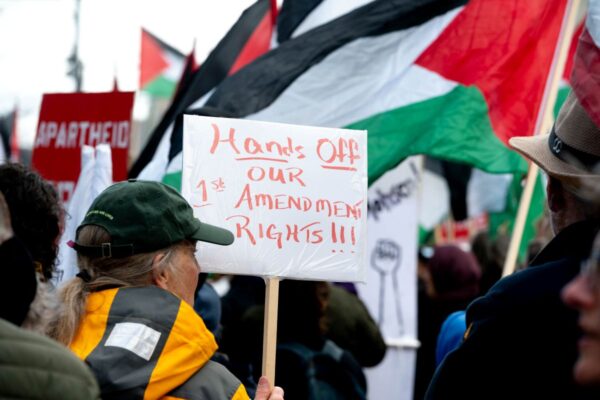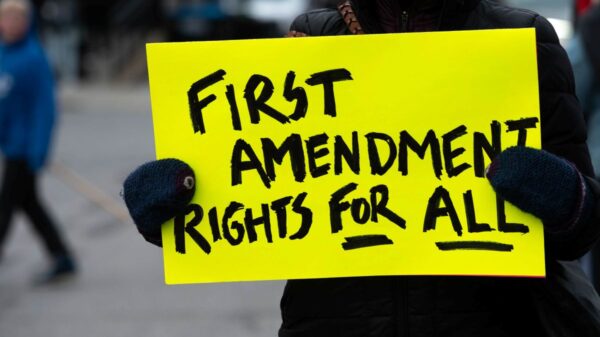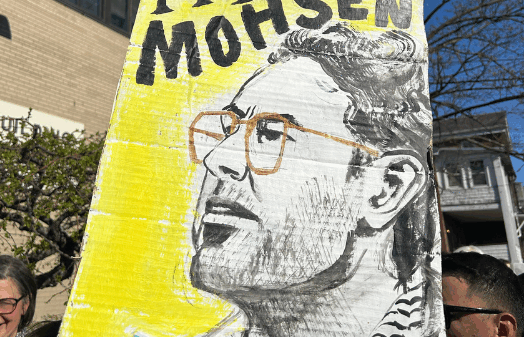Earlier this year, Vermont found itself thrust into a nationally and historically significant battle over core constitutional rights and democratic values.
At the center of that fight are two courageous ACLU of Vermont clients, Rümeysa Öztürk and Mohsen Mahdawi. In March, ICE officials arrested Rümeysa and shuttled her across state lines under the cover of night—from Massachusetts to New Hampshire, up to St. Albans, and ultimately to Louisiana—and in April, they arrested Mohsen Mahdawi after his citizenship interview in Colchester. Both were held in prison for weeks in retaliation for their constitutionally protected speech in support of Palestinian human rights.
These maneuvers by the federal government landed both of their cases in Vermont District Court—and alongside our partners, we struck a powerful blow against the president’s wrongful detention efforts when we secured the release of both Mohsen and Rümeysa in Vermont District Court.
Following our clients’ release from detention, the government appealed each of the Vermont District Court judges’ decisions to the Second Circuit Court of Appeals. On September 30th, we’re headed to court with our co-counsel to argue against the administration’s ongoing effort to punish our clients for speaking in support of Palestinian human rights.
How did we get here?
In March, six masked agents abducted Rümeysa off the street in Somerville, Massachusetts. They rushed her to St. Albans, where she remained overnight before being flown to Louisiana and imprisoned in an ICE detention facility. Because she was physically in Vermont when her attorneys filed a habeas petition seeking her release from custody, two federal judges agreed that her case should be heard in Vermont District Court—and the ACLU of Vermont joined the fight to bring her home. After she spent six grueling weeks in detention, Judge Sessions ordered her release, and Rümeysa returned home to resume her studies.
But Rümeysa would not be the last student targeted by the Trump administration for their protected speech. As our team exited the courthouse after a hearing in Rümeysa’s case on April 14th, one of our attorneys received a phone call informing her that Mohsen had been arrested by ICE agents at the Department of Homeland Security field office in Colchester. He had just finished his final citizenship interview—typically the last step in becoming a naturalized citizen—when masked agents entered the room, handcuffed him, and took him straight to the airport in Burlington.
The government’s plan to whisk Mohsen away from his lawyers and his community by flying him to Louisiana was thwarted when a federal judge blocked his transfer out of state. He was imprisoned for 16 days at the Northwest State Correctional Facility in St. Albans before a judge ordered his release. Mohsen was allowed to return home to the Upper Valley and, this fall, began a master’s program at Columbia University while his immigration and habeas cases proceed.
In each of these cases, the government appealed the Vermont District Court judges’ decisions to the Second Circuit Court of Appeals. A panel of three Second Circuit Court of Appeals judges denied the government’s request to pause their release via an emergency stay order. On September 30th, a new panel of three Second Circuit Court of Appeals judges will hear arguments on the merits of the government’s appeals.
Why were Mohsen and Rümeysa targeted?
Both of our clients were targeted as a direct result of their speech on matters of public concern—specifically, advocacy in support of Palestinian human rights.
Rümeysa, a Turkish PhD candidate at Tufts University, co-wrote an op-ed in her student newspaper last year in which she criticized the university for its response to student activism in support of Palestinians—speech that is clearly protected by the First Amendment. Mohsen, who was born and raised in a refugee camp in the West Bank, frequently spoke in public of his experience growing up in Palestine and led some of the student protests against the war in Gaza at Columbia University—exercising his well-established First Amendment right to freedom of expression.
These cases are prime examples of the assault on the rights of noncitizens and the First Amendment, as well as the Trump administration’s abuse of power more broadly. Anyone who is concerned about our fundamental civil rights and civil liberties should be concerned by the government’s actions in these cases, regardless of one’s immigration status or viewpoint on the war in Gaza.
What happens next?
At the heart of the government’s appeal in Mohsen’s case are two key questions: (1) whether or not a noncitizen can challenge their ICE detention in federal district court if their detention is unconstitutional—and (2) whether the district court overstepped its authority when the judge released him on bail while his case moves forward.
In Rümeysa’s case, the appeals court is considering similar questions, as well as whether or not a district court judge has the authority to order ICE to transfer a detainee from one state to another.
We do not know when the Second Circuit Court of Appeals will issue its decisions in these cases but will share updates when we have them. No matter where or how the government tries to violate people’s rights and cover its own tracks along the way, we will continue fighting from every corner of the country.
Join the fight today by making a donation to the ACLU of Vermont, becoming a member of the ACLU, or signing up for our Action Team.



